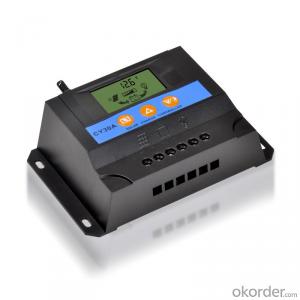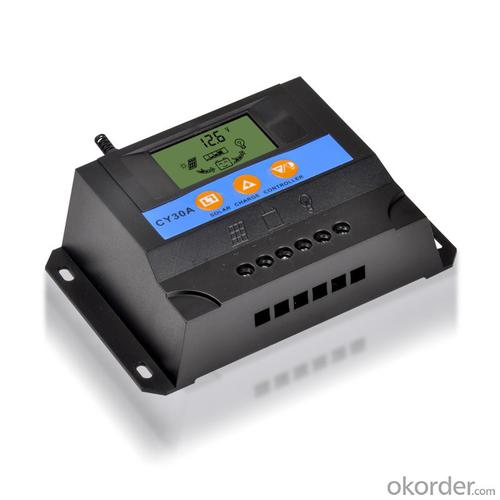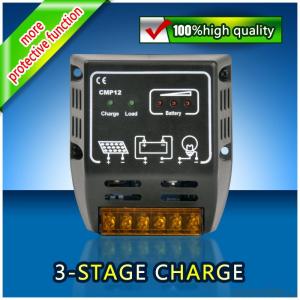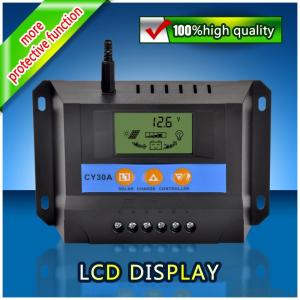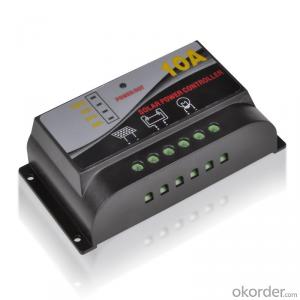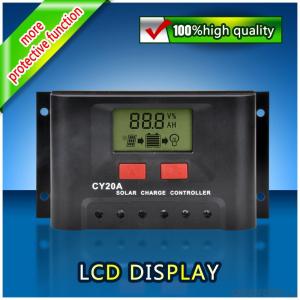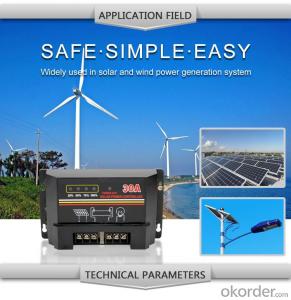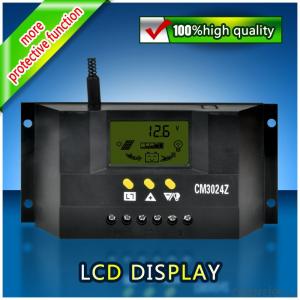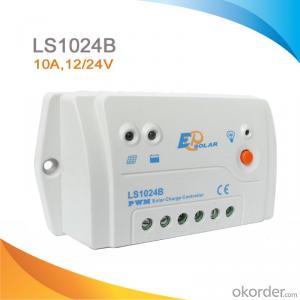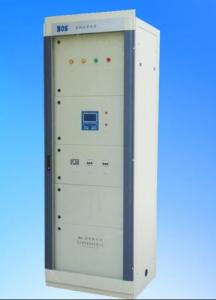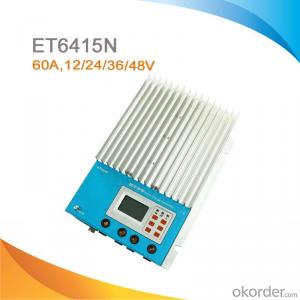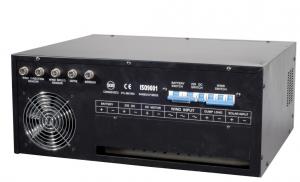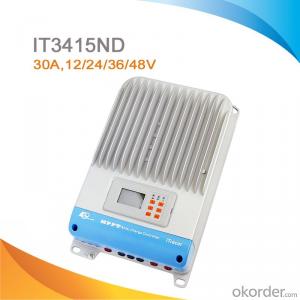Multiple Charge Controllers Solar LCD Controller CY50A with Best Price CY50A
- Loading Port:
- China main port
- Payment Terms:
- TT or LC
- Min Order Qty:
- 1 unit
- Supply Capability:
- 10000 unit/month
OKorder Service Pledge
OKorder Financial Service
You Might Also Like
Product Introduction
Solar controller is control device which can control solar panel and transform solar energy into electricity then store to the battery bank. Solar controller is the most important part in offgrid system, whose performance has much effect on life expectancy and operation of the whole system, especially the battery expectancy.
Application Areas
Standalone Photovoltaic power station
Standalone Domestic household photovoltaic power system
Mobil communication base stations, expressway and other non-residential regions.
Coastal islands, remote mountainous, border posts for regions shortage of or without electricity.
Government demonstration projects, landscape lighting project etc.
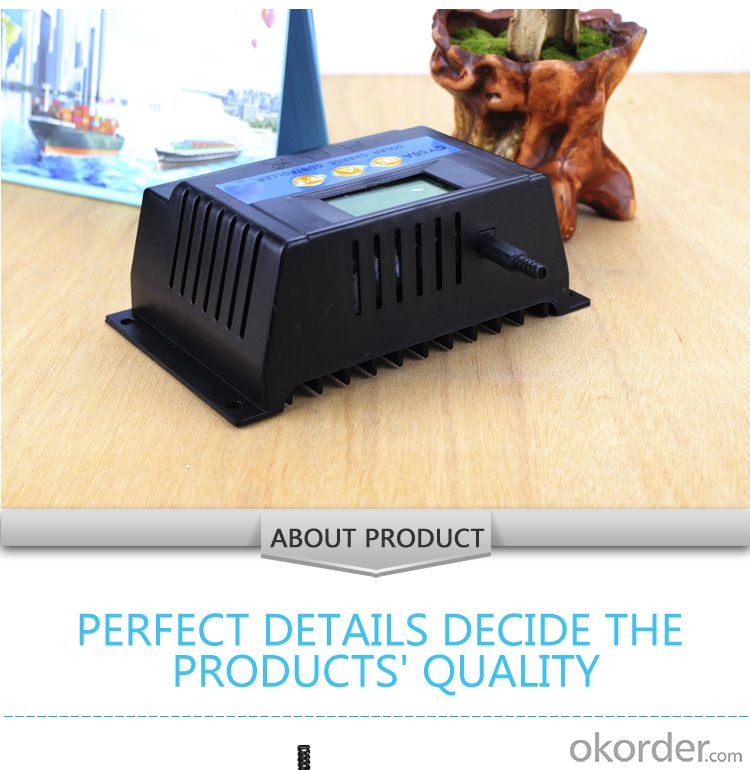
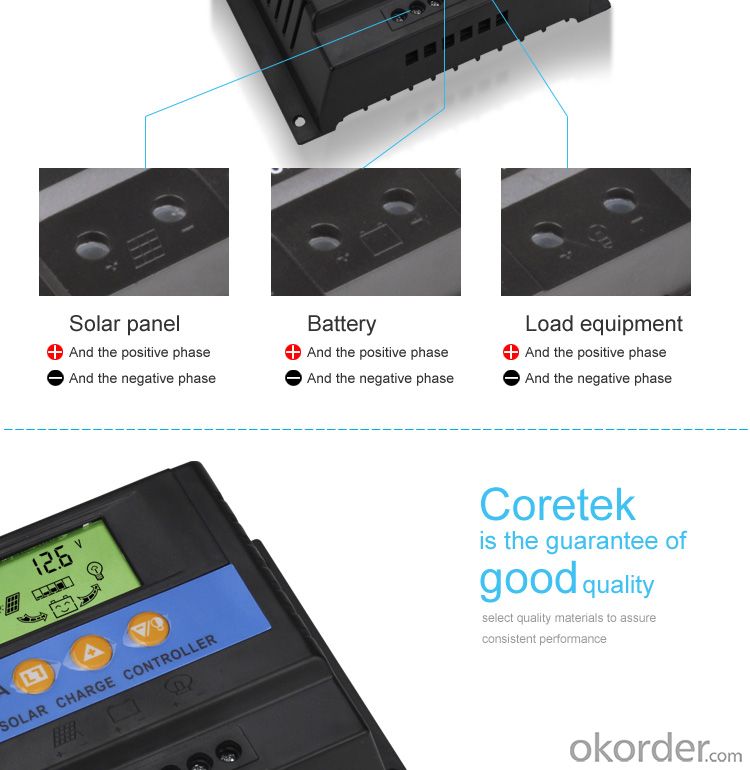
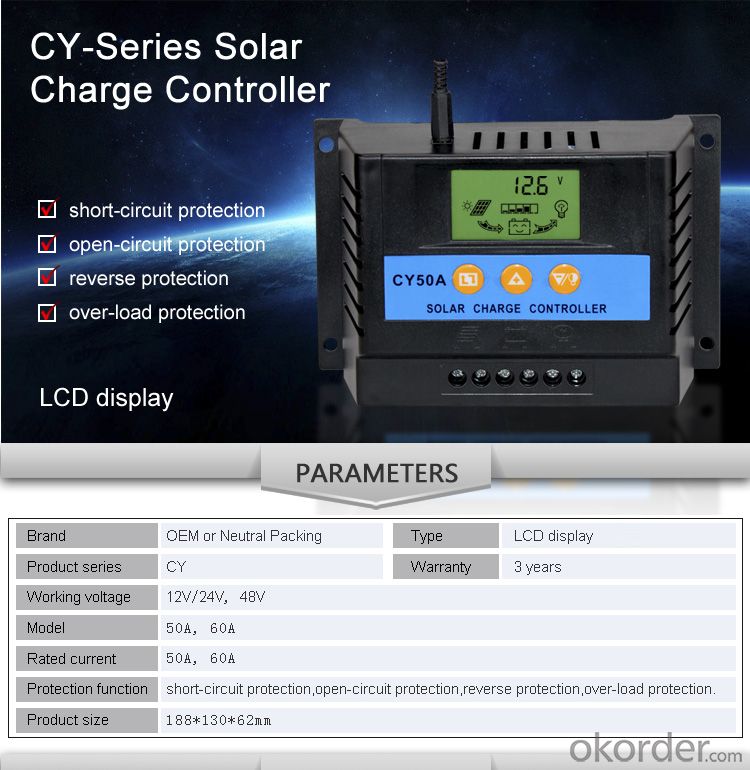
- Q: Can a solar controller be used with solar panels in parallel or series configuration?
- Solar panels can be used with a solar controller in both parallel and series arrangements. The purpose of the solar controller is to manage the energy flow from the panels to the battery or load. It safeguards the battery by regulating the voltage and current from the panels, preventing overcharging or damage. In a parallel arrangement, multiple panels are connected to the solar controller by joining the positive terminals and the negative terminals. This setup increases the system's current capacity while maintaining a constant voltage. The solar controller continues to regulate the overall voltage and current to protect the battery. In a series arrangement, multiple panels are connected to the solar controller by linking the positive terminal of one panel to the negative terminal of the next, and so on. This configuration enhances the system's voltage capacity while keeping the current constant. The solar controller ensures that the battery is not overcharged by regulating the overall voltage and current. Regardless of whether the panels are connected in parallel or series, the solar controller is crucial for proper charging and battery protection. It monitors the voltage and current from the panels and adjusts the charging parameters accordingly. Therefore, a solar controller is necessary to optimize the charging process and ensure the battery's longevity.
- Q: What is the maximum operating temperature of a solar controller?
- The maximum operating temperature of a solar controller varies depending on the specific model and manufacturer. However, most solar controllers are designed to operate within a temperature range of -10°C to 60°C (14°F to 140°F).
- Q: How does a solar controller handle battery capacity monitoring?
- A solar controller handles battery capacity monitoring by constantly measuring the voltage and current levels of the battery. It keeps track of the amount of charge going into and out of the battery and calculates the state of charge (SOC) based on these measurements. This allows the controller to determine the battery's capacity and prevent overcharging or over-discharging, ensuring optimal performance and longevity of the battery.
- Q: Can a solar controller be used in a solar-powered submarine?
- Yes, a solar controller can be used in a solar-powered submarine. A solar controller manages the flow of electricity from the solar panels to the batteries, ensuring that the batteries are charged efficiently and preventing overcharging. In a solar-powered submarine, the solar controller would be essential for regulating the power generated by the solar panels and storing it in the batteries to power the submarine's systems and propulsion.
- Q: Can a solar controller be used with a solar-powered hydrogen production system?
- Yes, a solar controller can be used with a solar-powered hydrogen production system. A solar controller helps regulate and optimize the charging of batteries from solar panels, ensuring efficient energy conversion and storage. In a solar-powered hydrogen production system, the solar controller can be used to control the charging of batteries that store excess solar energy, which can later be used to power the electrolysis process for hydrogen production.
- Q: How does a solar controller handle load control for powering other devices?
- A solar controller manages load control by regulating the flow of electricity from the solar panels to power other devices. It ensures that the power generated by the panels is distributed efficiently and effectively to meet the energy demands of the connected devices, while also protecting the battery bank from overcharging or discharging. The controller monitors the battery voltage and adjusts the charge/discharge cycle accordingly, ensuring optimal utilization of the available solar energy while preventing any damage to the system.
- Q: What is the power of the solar controller?
- The solar controller is represented by the maximum available current
- Q: Can a solar controller be used in a solar-powered drone charging system?
- Yes, a solar controller can be used in a solar-powered drone charging system. A solar controller helps regulate and optimize the charging process of a solar panel, ensuring the efficient transfer of energy from the panel to the drone's battery. It helps prevent overcharging, over-discharging, and protects the battery from damage.
- Q: What is the maximum distance a solar controller can be placed from the batteries?
- The maximum distance a solar controller can be placed from the batteries depends on various factors such as the gauge and type of wiring used, voltage drop considerations, and the specific controller's manufacturer recommendations. Generally, it is recommended to keep the distance between the solar controller and batteries within 10-15 feet to minimize potential voltage drop issues and ensure efficient charging. However, it is always advisable to consult the controller's instruction manual or contact the manufacturer for specific distance guidelines.
- Q: What is the maximum input power for a solar controller?
- The maximum input power for a solar controller depends on its specifications and design. Generally, solar controllers can handle input powers ranging from 10 to 60 amps or more, depending on the model. It is crucial to consult the manufacturer's specifications or user manual to determine the exact maximum input power for a specific solar controller.
Send your message to us
Multiple Charge Controllers Solar LCD Controller CY50A with Best Price CY50A
- Loading Port:
- China main port
- Payment Terms:
- TT or LC
- Min Order Qty:
- 1 unit
- Supply Capability:
- 10000 unit/month
OKorder Service Pledge
OKorder Financial Service
Similar products
Hot products
Hot Searches
Related keywords
